Saturday, March 28, 2009
Our Blessed Lady's Saturday
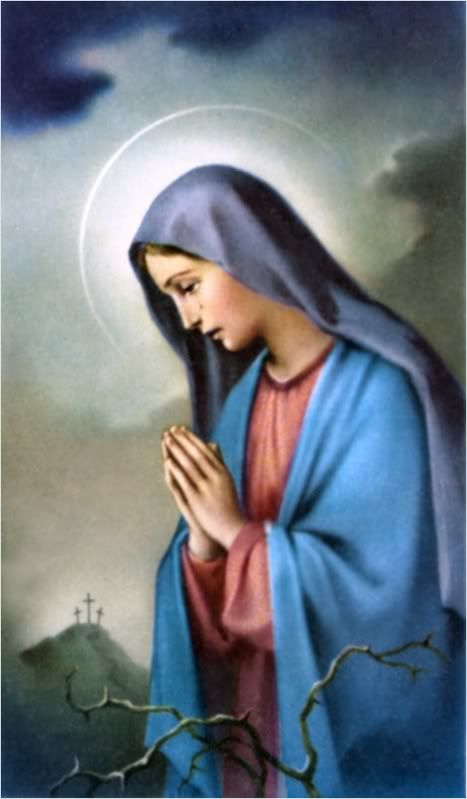
The Rosary of Our Lady's Tears
Next to the Most Precious Blood of Jesus there is nothing more touching and effective than the tears of our heavenly Mother! How many tears she shed on the Way of the Cross and when she stood beneath the Cross! She shed bitter tears in reparation for the many insults her Divine Son then and which He would receive in the future. She wept bitter tears for the many souls who would not submit to the Commandments of God, and so would be lost forever.
In recent centuries, too, she wept tears of sorrow: The account of the apparitions of Our Lady of La Salette on September 19, 1846, is very moving as is also the account of Mary's tears at Syracuse.
There the image of Our Lady wept again and again from a simple terra cotta plaque in the house of a poor worker, from August 29 to September 2, 1953. After a thorough investigation the bishops of Sicily, Italy, confirmed this miracle of tears. Hundreds of thousands came to see it, and Pope Pius XII exclaimed on the radio, "O the tears of Mary!"
THE ORIGIN OF THE CHAPLET
This rosary or chaplet was revealed in 1929 and 1930, by Our Lord and His most holy Mother to Sister Amalia in Campina, Brazil, and was confirmed as supernatural by Bishop Campos Baretto.
Our Lords words to Sister Amalia on November 8, 1929 were:
"My daughter, whatever I am asked through the tears of My Mother, I shall give lovingly."
On March 8, 1930 the most Pure Mother stated:
"Through this rosary the devil will be subdued and the power of Hell will be destroyed. Prepare yourself for this great combat."
Today the devil has much power because we have forgotten sin and no longer believe that Satan exists.
HOW TO PRAY THE ROSARY OF TEARS:
THE CHAPLET IS PRAYED WITH REGULAR ROSARY BEADS IF YOU DO NOT HAVE THE SPECIAL CHAPLET BEADS, EXCEPT YOU SAY SEVEN DECADES.
INSTEAD OF THE CREED, SAY:
Crucified Jesus! We fall at Your feet and offer You the tears of her who with deep compassionate love accompanied You on Your sorrowful Way of the Cross. Grant, O Good Master, that we take to heart the lessons which the tears of Your most holy Mother teach us, so that we may fulfill Your holy will on earth, that we may be worthy to praise and exalt You in Heaven for all eternity.
INSTEAD OF THE OUR FATHER, SAY:
V. O Jesus, look upon the tears of her who loved You most on earth
R. And loves You most ardently in Heaven.
INSTEAD OF THE HAIL MARY, SAY:
V. O Jesus, hear our prayers
R. For the sake of Your most holy Mother's tears.
At the end repeat three times on the small beads the invocations that replace the Our Father.
Conclude with this prayer:
O Mary, Mother of love, sorrow and mercy, we beg you to unite your prayers with ours so that Jesus, your Divine Son, to Whom we turn may hear our petitions in the name of your maternal tears and may give us in addition to the favors we ask, the crown of everlasting life. Amen.
Labels: Our Blessed Lady
Saturday Of the Fourth Week In Lent
Stational Church:
S. Nicola in Carcere
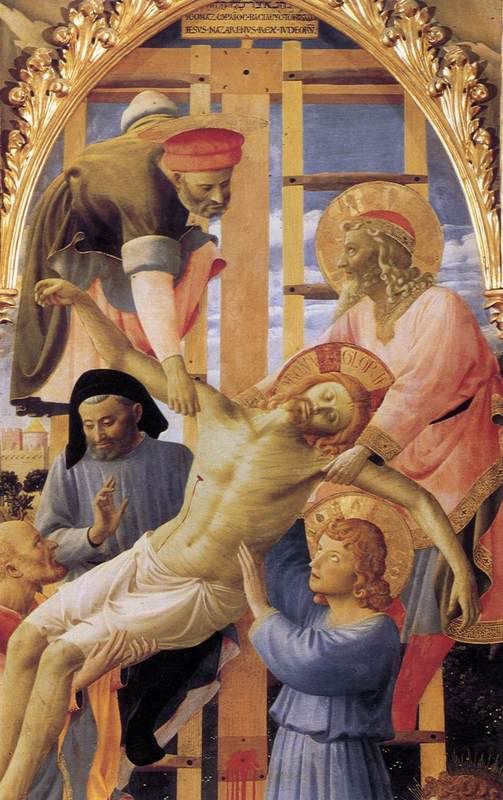
Devotions for a Lenten Saturday holy hour:
Divine Mercy Chaplet
Seven Penitential Psalms
Prayer of St. Thomas More
Threnus Prayer of Saint Augustine
Stabat Mater Dolorosa
Litany of Our Lady of Sorrows
Sorrowful Mysteries
S. Nicola in Carcere

Devotions for a Lenten Saturday holy hour:
Divine Mercy Chaplet
Seven Penitential Psalms
Prayer of St. Thomas More
Threnus Prayer of Saint Augustine
Stabat Mater Dolorosa
Litany of Our Lady of Sorrows
Sorrowful Mysteries
Labels: Lent
Friday, March 27, 2009
Friday At the Foot Of the Cross
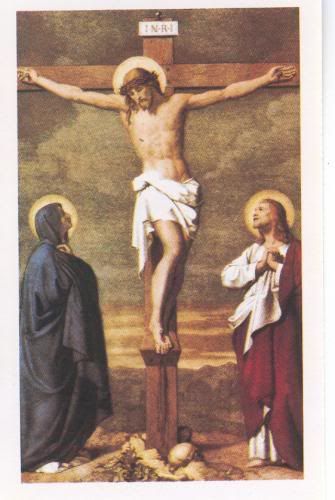
Antiphon:
Remember not, O Lord, my offenses, nor the offenses of my fathers, nor takest Thou vengeance upon them.
Psalm 101
Domine, exaudi. A prayer for one in affliction: the fifth penitential psalm.
1 The prayer of the poor man, when he was anxious, and poured out his supplication before the Lord. 2 Hear, O Lord, my prayer: and let my cry come to thee. 3 Turn not away thy face from me: in the day when I am in trouble, incline thy ear to me. In what day soever I shall call upon thee, hear me speedily. 4 For my days are vanished like smoke: and my bones are grown dry like fuel for the fire. 5 I am smitten as grass, and my heart is withered: because I forgot to eat my bread.
6 Through the voice of my groaning, my bone hath cleaved to my flesh. 7 I am become like to a pelican of the wilderness: I am like a night raven in the house. 8 I have watched, and am become as a sparrow all alone on the housetop. 9 All the day long my enemies reproached me: and they that praised me did swear against me. 10 For I did eat ashes like bread, and mingled my drink with weeping.
7 "A pelican"... I am become through grief, like birds that affect solitude and darkness.
11 Because of thy anger and indignation: for having lifted me up thou hast thrown me down. 12 My days have declined like a shadow, and I am withered like grass. 13 But thou, O Lord, endurest for ever: and thy memorial to all generations. 14 Thou shalt arise and have mercy on Sion: for it is time to have mercy on it, for the time is come. 15 For the stones thereof have pleased thy servants: and they shall have pity on the earth thereof.
16 And the Gentiles shall fear thy name, O Lord, and all the kings of the earth thy glory. 17 For the Lord hath built up Sion: and he shall be seen in his glory. 18 He hath had regard to the prayer of the humble: and he hath not despised their petition. 19 Let these things be written unto another generation: and the people that shall be created shall praise the Lord: 20 Because he hath looked forth from his high sanctuary: from heaven the Lord hath looked upon the earth.
21 That he might hear the groans of them that are in fetters: that he might release the children of the slain: 22 That they may declare the name of the Lord in Sion: and his praise in Jerusalem; 23 When the people assemble together, and kings, to serve the Lord. 24 He answered him in the way of his strength: Declare unto me the fewness of my days. 25 Call me not away in the midst of my days: thy years are unto generation and generation.
24 "He answered him in the way of his strength"... That is, the people, mentioned in the foregoing verse, or the penitent, in whose person this psalm is delivered, answered the Lord in the way of his strength: that is, according to the best of his power and strength: or when he was in the flower of his age and strength: inquiring after the fewness of his days: to know if he should live long enough to see the happy restoration of Sion, etc.
26 In the beginning, O Lord, thou foundedst the earth: and the heavens are the works of thy hands. 27 They shall perish but thou remainest: and all of them shall grow old like a garment: And as a vesture thou shalt change them, and they shall be changed. 28 But thou art always the selfsame, and thy years shall not fail. 29 The children of thy servants shall continue: and their seed shall be directed for ever.
Glory be to the Father, and to the Son, and to the Holy Ghost, as it was in the beginning, is now, and always will be in the World of Worlds.
Amen.
Antiphon:
Remember not, O Lord, my offenses, nor the offenses of my fathers, nor takest Thou vengeance upon them.
GLORY be to the Father, and to the Son, and to the Holy Spirit. As it was in the beginning, is now, and will be forever. Amen.
Prayer Against Gluttony
O wretched me, who hath forsaken Thee, Lord God, the font of living water. I have dug myself cisterns of earthly delights, broken cisterns, that can hold no living water! (cf Jer 2:13) Verily have I forgotten to eat my bread, the bread of life, having in it all delight and sweetness of taste. Instead I was eager to fill my belly with the husks pigs eat. (Lk 15:16) As yet food was in the mouth of the Sons of Israel, when God's anger descended upon them: and is so often spared me, who thru intemperance of food and drink has been formed in the likeness of a beast and not in Thy image, O God. O how in the end might I eat ashes like bread and mingle tears with my drink. May my food be to do Thy will in everything, Thou who shalt make us drink from the river of Thy delights. (Ps 35:9)
Labels: Friday At the Foot Of the Cross
Friday Of the Fourth Week In Lent
Station Church:
S. Eusebio all'Esquilino
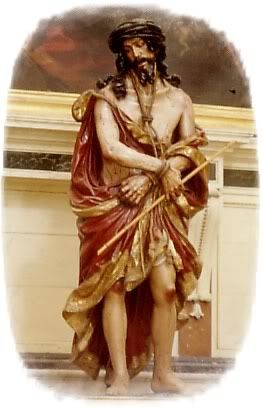
Devotions for a Lenten Friday holy hour:
Dies Irae
Divine Mercy Chaplet
Seven Penitential Psalms
Prayer of St. Thomas More
Threnus Prayer of Saint Augustine
Devotions To the Holy Cross
The Stations of the Cross
Two weeks until Good Friday
S. Eusebio all'Esquilino

Devotions for a Lenten Friday holy hour:
Dies Irae
Divine Mercy Chaplet
Seven Penitential Psalms
Prayer of St. Thomas More
Threnus Prayer of Saint Augustine
Devotions To the Holy Cross
The Stations of the Cross
Two weeks until Good Friday
Labels: Lent
Thursday, March 26, 2009
Thursday Of the Fourth Week In Lent
Station Church:
Ss. Silvestro e Martino ai Monti

Devotions for a Lenten Thursday holy hour:
Dies Irae
Divine Mercy Chaplet
Seven Penitential Psalms
Prayer of St. Thomas More
Threnus Prayer of Saint Augustine
Devotion To the Holy Face
Ss. Silvestro e Martino ai Monti

Devotions for a Lenten Thursday holy hour:
Dies Irae
Divine Mercy Chaplet
Seven Penitential Psalms
Prayer of St. Thomas More
Threnus Prayer of Saint Augustine
Devotion To the Holy Face
Labels: Lent
Wednesday, March 25, 2009
Lady Day, Or the Feast Of the Annunciation
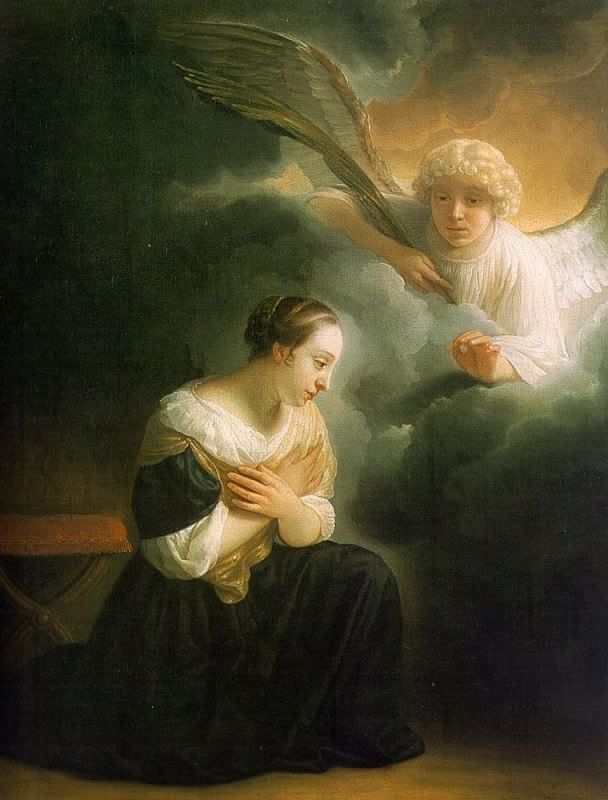
V. Angelus Domini nuntiavit Mariae
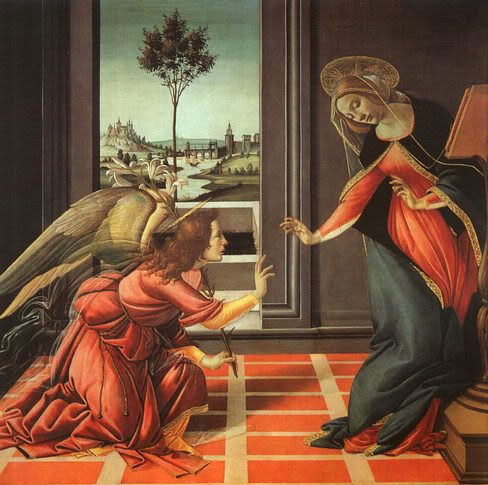
R. Et concepit de Spirito Sancto. Ave Maria...
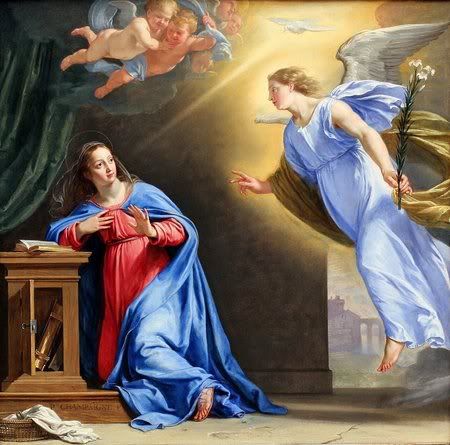
V. Ecce ancilla Domini
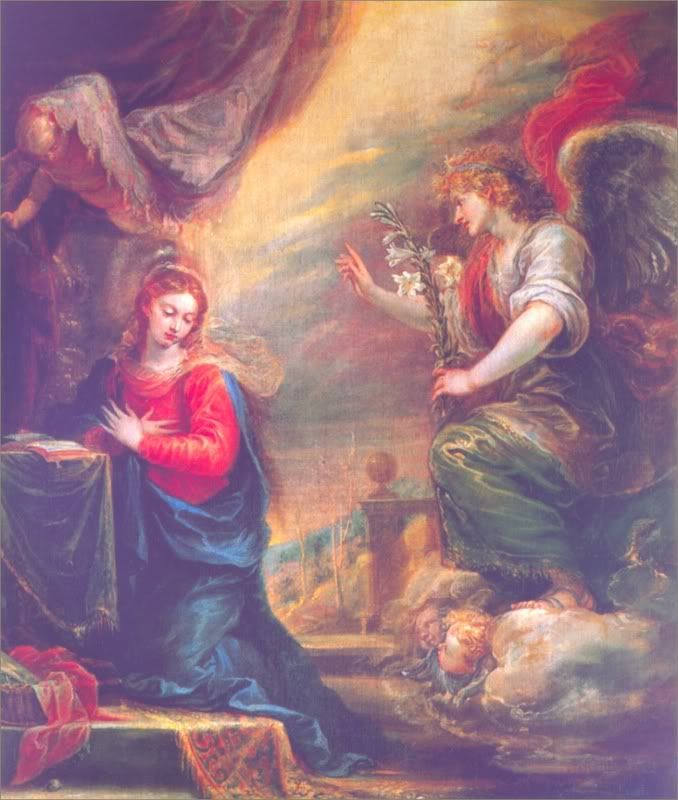
R. Fiat mihi secundum verbum tuum. Ave Maria...
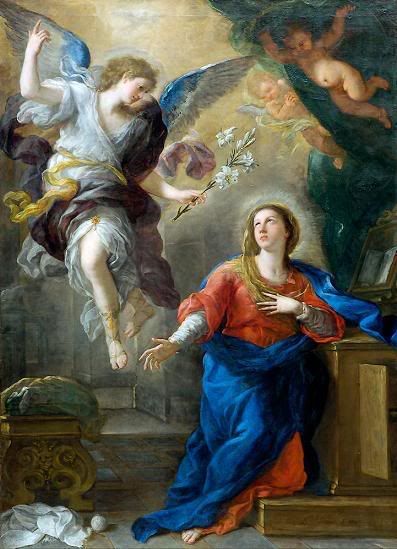
V. Genuflect. Et Verbum Caro Factum Est.
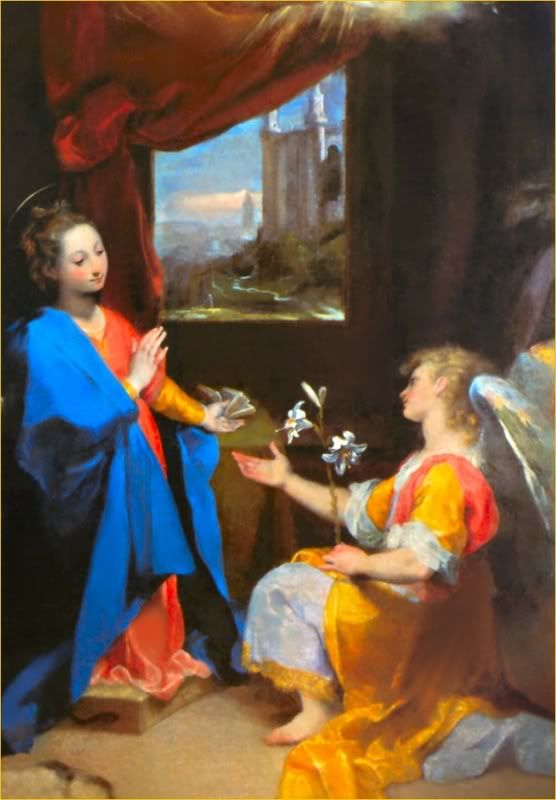
Et habitavit in nobis.
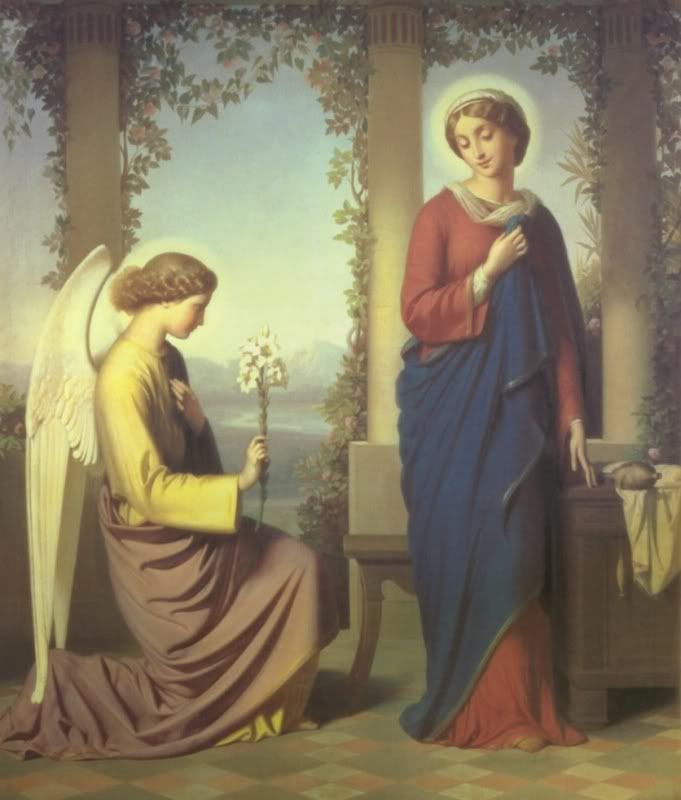
Oremus:
Gratiam tuam, quaesumus, Domine, mentibus nostris infunde; ut qui, Angelo nuntiante, Christi Filii tui incarnationem cognovimus, per passionem eius et crucem, ad resurrectionis gloriam perducamur. Per eundem Christum Dominum nostrum.
R. Amen.
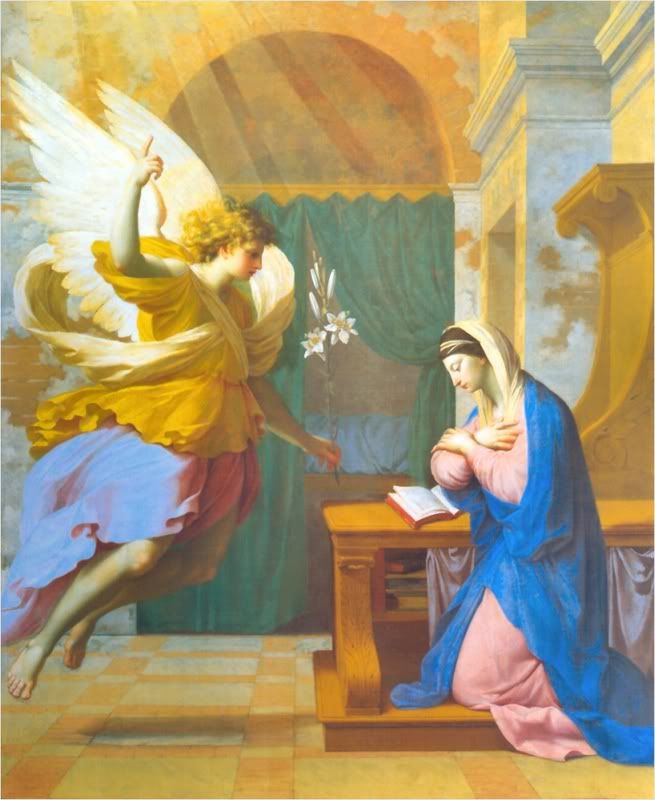
Labels: Our Blessed Lady
Wednesday Of the Fourth Week In Lent
Station Church:
St. Paul Outside the Walls

Devotions for a Lenten Wednesday holy hour:
Dies Irae
Divine Mercy Chaplet
Seven Penitential Psalms & the prayers against the Seven Deadly Sins
Prayer of St. Thomas More
Threnus Prayer
Seven Prayers of St. Gregory
St. Paul Outside the Walls

Devotions for a Lenten Wednesday holy hour:
Dies Irae
Divine Mercy Chaplet
Seven Penitential Psalms & the prayers against the Seven Deadly Sins
Prayer of St. Thomas More
Threnus Prayer
Seven Prayers of St. Gregory
Labels: Lent
Tuesday, March 24, 2009
Just A Thought To Cheer You Up
Lent is longer than the other penitential season, Advent. In fact, if this were Advent, as we are today on day 28, Advent would have lasted as long as it can possibly last (Christmas Day falling on a Sunday), and today would be Christmas Eve!
But there are still more than 2.5 weeks remaining until Easter Sunday.
And the heavy trucking of the penitential period begins after tomorrow, which is Lady Day.
But there are still more than 2.5 weeks remaining until Easter Sunday.
And the heavy trucking of the penitential period begins after tomorrow, which is Lady Day.
Labels: Lent
Tuesday Of the Fourth Week In Lent
Station Church:
S. Lorenzo in Damaso
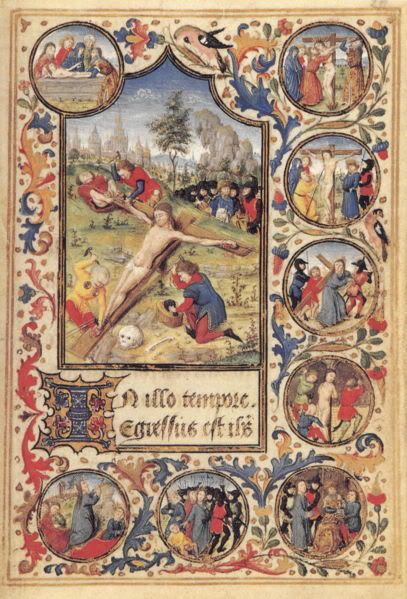
Devotions for a Lenten Tuesday holy hour:
Dies Irae
Divine Mercy Chaplet
Seven Penitential Psalms
Prayer of St. Thomas More
Threnus Prayer of Saint Augustine
Devotion of the Seven Last Words
S. Lorenzo in Damaso

Devotions for a Lenten Tuesday holy hour:
Dies Irae
Divine Mercy Chaplet
Seven Penitential Psalms
Prayer of St. Thomas More
Threnus Prayer of Saint Augustine
Devotion of the Seven Last Words
Labels: Lent
Monday, March 23, 2009
Monday Of the Fourth Week In Lent
Station Church:
Ss. Quattro Coronati al Celio
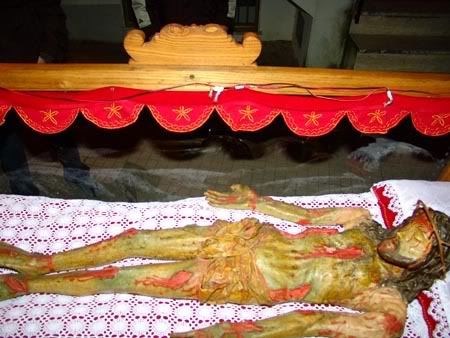
Devotions for a Lenten Monday holy hour:
Dies Irae
Divine Mercy Chaplet
Seven Penitential Psalms
Prayer of St. Thomas More
Threnus Prayer of Saint Augustine
Devotion of the Five Sacred Wounds
Ss. Quattro Coronati al Celio

Devotions for a Lenten Monday holy hour:
Dies Irae
Divine Mercy Chaplet
Seven Penitential Psalms
Prayer of St. Thomas More
Threnus Prayer of Saint Augustine
Devotion of the Five Sacred Wounds
Labels: Lent
Sunday, March 22, 2009
Laetare Sunday
Station Church:
S. Croce in Gerusalemme
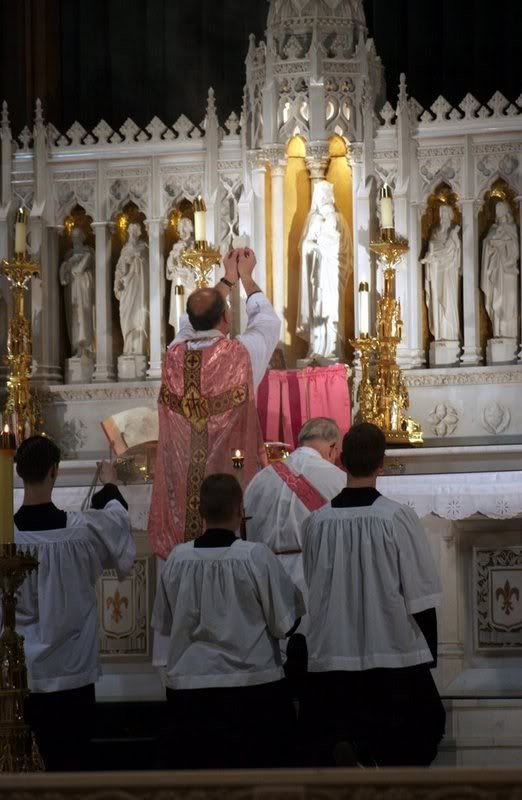
I'm cheating here. I think this is actually a photo of a Gaudete Sunday Mass in Advent, but at least it is a "Rose-Colored Sunday! If I come across a true traditionalist Laetare Sunday photo, I'll post it instead. And I know that there is a lot of controversy about this shade of pink, with many insisting, with good reason, that one should use a pink that is more like red or rose, but again, find me a better picture of the traditional Mass on Laetare Sunday, and I will use it.
Devotions for a Lenten Sunday holy hour:
Divine Mercy Chaplet
Seven Penitential Psalms
Prayer of St. Thomas More
Psalter of St. Jerome
Threnus Prayer of St. Augustine
From The Liturgical Year, by Abbot Prosper Gueranger, OSB:
This Sunday, called, from the first word of the Introit, Laetare Sunday, is one of the most solemn of the year. The Church interrupts her lenten mournfulness; the chants of the Mass speak of nothing but joy and consolation; the organ, which has been silent during the preceding three Sundays, now gives forth its melodious voice; the deacon resumes his dalmatic, and the subdeacon his tunic; and instead of purple, rose-coloured vestments are allowed to be used. These same rites were practised in Advent, on the third Sunday, called Gaudete. The Church's motive for introducing this expression of joy into to-day's liturgy is to encourage her children to persevere fervently to the end of this holy season. The real mid-Lent was last Thursday, as we have already observed; but the Church, fearing lest the joy might lead to some infringement on the spirit of penance, has deferred her own notice of it to this Sunday, when she not only permits, but even bids, her children to rejoice!
The Station at Rome is in the basilica of Holy Cross in Jerusalem, one of the seven principal churches of the holy city. It was built in the fourth century, by the emperor Constantine, in one of his villas called Sessorius, on which account it goes also under the name of the Sessorian basilica. The emperor's mother, St. Helen, enriched it with most precious relics, and wished to make it the Jerusalem of Rome. With this intention she ordered a great quantity of earth taken from Mount Calvary to be put on the site. Among the other relics of the instruments of the Passion which she gave to this church was the inscription which was fastened to the cross; it is still there, and is called the Title of the Cross. The name of Jerusalem, which has been given to this basilica, and which recalls to our minds the heavenly Jerusalem towards which we are tending, suggested the choice of it as to-day's Station. Up to the fourteenth century, when Avignon became for a time the city of the Popes, the ceremony of the golden rose took place in this church; at present, it is blessed in the palace where the sovereign Pontiff happens to be residing at this season.
The blessing of the golden rose is one of the ceremonies peculiar to the fourth Sunday of Lent, which is called on this account Rose Sunday. The thoughts suggested by this flower harmonize with the sentiments wherewith the Church would now inspire her children. The joyous time of Easter is soon to give them a spiritual spring, of which that of nature is but a feeble image. Hence, we cannot be surprised that the institution of this ceremony is of a very ancient date. We find it observed under the pontificate of St. Leo IX. (eleventh century); and we have a sermon on the golden rose preached by the glorious Pope Innocent III., on this Sunday, and in the basilica of Holy Cross in Jerusalem. In the middle ages, when the Pope resided in the Lateran palace, having first blessed the rose, he went on horseback to the church of the Station. He wore the mitre, was accompanied by all the Cardinals, and held the blessed flower in his hand. Having reached the basilica, he made a discourse on the mysteries symbolized by the beauty, the colour, and the fragrance of the rose. Mass was then celebrated. After the Mass, the Pope returned to tile Lateran palace. Surrounded by the sacred college, he rode across the immense plain which separates the two basilicas, with the mystic flower still in his hand. We may imagine the joy of the people as they gazed upon the holy symbol. When the procession had reached the palace gates, if there were a prince present, it was his privilege to hold the stirrup, and assist the Pontiff to dismount; for which filial courtesy he received the rose, which had received so much honour and caused such joy.
At present, the ceremony is not quite so solemn; still the principal rites are observed. The Pope blesses the golden rose in the vestiary; he anoints it with holy chrism, over which he sprinkles a scented powder, as formerly; and when the hour for Mass has come, he goes to the palace chapel, holding the flower in his hand. During the holy Sacrifice, it is fastened to a golden rose-branch prepared for it on the altar. After the Mass, it is brought to the Pontiff, who holds it in his hand as he returns from the chapel to the vestiary. It is usual for the Pope to send the rose to some prince or princess, as a mark of honour; sometimes, it is a city or a Church that receives the flower.
We subjoin a free translation of the beautiful prayer used by the sovereign Pontiff when blessing the golden rose. It will give our readers a clearer appreciation of this ceremony, which adds so much solemnity to the fourth Sunday of Lent. 'O God! by whose word and power all things were created, and by whose will they are all governed! O Thou that art the joy and gladness of all Thy faithful people! we beseech Thy divine Majesty, that Thou vouchsafe to bless and sanctify this rose, so lovely in its beauty and fragrance. We are to bear it, this day, in our hands, as a symbol of spiritual joy; that thus the people that is devoted to Thy service, being set free from the captivity of Babylon by the grace of Thine only-begotten Son who is the glory and the joy of Israel, may show forth, with a sincere heart, the joys of that Jerusalem, which is above, and is our mother. And whereas Thy Church, seeing this symbol, exults with joy for the glory of Thy Name; do thou, O Lord! give her true and perfect happiness. Accept her devotion, forgive us our sins, increase our faith; heal us by Thy word, protect us by Thy mercy; remove all obstacles; grant us all blessings; that thus this same Thy Church may offer unto Thee the fruit of good works; and walking in the odour of the fragrance of that Flower, which sprang from the root of Jesse, and is called the Flower of the field, and the Lily of the valley, may she deserve to enjoy an endless joy in the bosom of heavenly glory, in the society of all the saints, together with that divine Flower, who liveth and reigneth with Thee in the unity of the Holy Ghost, world without end. Amen.'
We now come to the explanation of another name given tot the fourth Sunday of Lent, which was suggested by the Gospel of the day. We find this Sunday called in several ancient documents, the Sunday of the five loaves. The miracle alluded to in this title not only forms an essential portion of the Church's instructions during Lent, but it is also an additional element of to-day's joy. We forget for an instant the coming Passion of the Son of God, to give our attention to the greatest of the benefits He has bestowed on us; for under the figure of these loaves multiplied by the power of Jesus, our faith sees that Bread which came down from heaven, and giveth life to the world.1 'The Pasch,' says our Evangelist, 'was near at hand'; and, in a few days, our Lord will say to us: 'With desire I have desired to eat this Pasch with you.'2 Before leaving this world to go to His Father, Jesus desires to feed the multitude that follows Him; and in order to do this, He displays His omnipotence. Well may we admire that creative power, which feeds five thousand men with five loaves and two fishes, and in such wise that even after all have partaken of the feast as much as they would, there remain fragments enough to fill twelve baskets. Such a miracle is, indeed, an evident proof of Jesus' mission; but He intends it as a preparation for something far more wonderful; He intends it as a figure and a pledge of what He is soon to do, not merely once or twice, but every day, even to the end of time; not only for five thousand men, but for the countless multitude of believers. Think of the millions, who, this very year, are to partake of the banquet of the Pasch; and yet, He whom we have seen born in Bethlehem (the house of bread) is to be the nourishment of all these guests; neither will the divine Bread fail. We are to feast as did our fathers before us; and the generations that are to follow us, shall be invited as we now are, to come and taste how sweet is the Lord.3
But observe, it is in a desert place, as we learn from St. Matthew,4 that Jesus feeds these men, who represent us Christians. They have quitted the bustle and noise of cities in order to follow Him. So anxious are they to hear His words, that they fear neither hunger nor fatigue; and their courage is rewarded. A like recompense will crown our labours, our fasting and abstinence, which are now more than half over. Let us, then, rejoice, and spend this day with the light-heartedness of pilgrims who are near the end of their journey. The happy moment is advancing, when our soul, united and filled with her God, will look back with pleasure on the fatigues of the body, which, together with our heart's compunction, have merited for her a place at the divine banquet.
The primitive Church proposed this miracle of the multiplication of the loaves as a symbol of the Eucharist, the Bread that never fails. We find it frequently represented in the paintings of the catacombs and on the bas-reliefs of the ancient Christian tombs. The fishes, too, that were given together with the loaves, are represented on these venerable monuments of our faith; for the early Christians considered the fish to be the symbol of Christ, because the word 'fish' in Greek is made up of five letters, which are the initials of these words: Jesus Christ, Son (of) God, Saviour.
In the Greek Church this is the last day of the week called, as we have already noticed, Mesonestios. Breaking through her rule of never admitting a saint's feast during Lent, she keeps this mid-Lent Sunday in honour of the celebrated abbot of the monastery of Mount Sinai, St. John Climacus, who lived in the sixth century.
S. Croce in Gerusalemme

I'm cheating here. I think this is actually a photo of a Gaudete Sunday Mass in Advent, but at least it is a "Rose-Colored Sunday! If I come across a true traditionalist Laetare Sunday photo, I'll post it instead. And I know that there is a lot of controversy about this shade of pink, with many insisting, with good reason, that one should use a pink that is more like red or rose, but again, find me a better picture of the traditional Mass on Laetare Sunday, and I will use it.
Devotions for a Lenten Sunday holy hour:
Divine Mercy Chaplet
Seven Penitential Psalms
Prayer of St. Thomas More
Psalter of St. Jerome
Threnus Prayer of St. Augustine
From The Liturgical Year, by Abbot Prosper Gueranger, OSB:
This Sunday, called, from the first word of the Introit, Laetare Sunday, is one of the most solemn of the year. The Church interrupts her lenten mournfulness; the chants of the Mass speak of nothing but joy and consolation; the organ, which has been silent during the preceding three Sundays, now gives forth its melodious voice; the deacon resumes his dalmatic, and the subdeacon his tunic; and instead of purple, rose-coloured vestments are allowed to be used. These same rites were practised in Advent, on the third Sunday, called Gaudete. The Church's motive for introducing this expression of joy into to-day's liturgy is to encourage her children to persevere fervently to the end of this holy season. The real mid-Lent was last Thursday, as we have already observed; but the Church, fearing lest the joy might lead to some infringement on the spirit of penance, has deferred her own notice of it to this Sunday, when she not only permits, but even bids, her children to rejoice!
The Station at Rome is in the basilica of Holy Cross in Jerusalem, one of the seven principal churches of the holy city. It was built in the fourth century, by the emperor Constantine, in one of his villas called Sessorius, on which account it goes also under the name of the Sessorian basilica. The emperor's mother, St. Helen, enriched it with most precious relics, and wished to make it the Jerusalem of Rome. With this intention she ordered a great quantity of earth taken from Mount Calvary to be put on the site. Among the other relics of the instruments of the Passion which she gave to this church was the inscription which was fastened to the cross; it is still there, and is called the Title of the Cross. The name of Jerusalem, which has been given to this basilica, and which recalls to our minds the heavenly Jerusalem towards which we are tending, suggested the choice of it as to-day's Station. Up to the fourteenth century, when Avignon became for a time the city of the Popes, the ceremony of the golden rose took place in this church; at present, it is blessed in the palace where the sovereign Pontiff happens to be residing at this season.
The blessing of the golden rose is one of the ceremonies peculiar to the fourth Sunday of Lent, which is called on this account Rose Sunday. The thoughts suggested by this flower harmonize with the sentiments wherewith the Church would now inspire her children. The joyous time of Easter is soon to give them a spiritual spring, of which that of nature is but a feeble image. Hence, we cannot be surprised that the institution of this ceremony is of a very ancient date. We find it observed under the pontificate of St. Leo IX. (eleventh century); and we have a sermon on the golden rose preached by the glorious Pope Innocent III., on this Sunday, and in the basilica of Holy Cross in Jerusalem. In the middle ages, when the Pope resided in the Lateran palace, having first blessed the rose, he went on horseback to the church of the Station. He wore the mitre, was accompanied by all the Cardinals, and held the blessed flower in his hand. Having reached the basilica, he made a discourse on the mysteries symbolized by the beauty, the colour, and the fragrance of the rose. Mass was then celebrated. After the Mass, the Pope returned to tile Lateran palace. Surrounded by the sacred college, he rode across the immense plain which separates the two basilicas, with the mystic flower still in his hand. We may imagine the joy of the people as they gazed upon the holy symbol. When the procession had reached the palace gates, if there were a prince present, it was his privilege to hold the stirrup, and assist the Pontiff to dismount; for which filial courtesy he received the rose, which had received so much honour and caused such joy.
At present, the ceremony is not quite so solemn; still the principal rites are observed. The Pope blesses the golden rose in the vestiary; he anoints it with holy chrism, over which he sprinkles a scented powder, as formerly; and when the hour for Mass has come, he goes to the palace chapel, holding the flower in his hand. During the holy Sacrifice, it is fastened to a golden rose-branch prepared for it on the altar. After the Mass, it is brought to the Pontiff, who holds it in his hand as he returns from the chapel to the vestiary. It is usual for the Pope to send the rose to some prince or princess, as a mark of honour; sometimes, it is a city or a Church that receives the flower.
We subjoin a free translation of the beautiful prayer used by the sovereign Pontiff when blessing the golden rose. It will give our readers a clearer appreciation of this ceremony, which adds so much solemnity to the fourth Sunday of Lent. 'O God! by whose word and power all things were created, and by whose will they are all governed! O Thou that art the joy and gladness of all Thy faithful people! we beseech Thy divine Majesty, that Thou vouchsafe to bless and sanctify this rose, so lovely in its beauty and fragrance. We are to bear it, this day, in our hands, as a symbol of spiritual joy; that thus the people that is devoted to Thy service, being set free from the captivity of Babylon by the grace of Thine only-begotten Son who is the glory and the joy of Israel, may show forth, with a sincere heart, the joys of that Jerusalem, which is above, and is our mother. And whereas Thy Church, seeing this symbol, exults with joy for the glory of Thy Name; do thou, O Lord! give her true and perfect happiness. Accept her devotion, forgive us our sins, increase our faith; heal us by Thy word, protect us by Thy mercy; remove all obstacles; grant us all blessings; that thus this same Thy Church may offer unto Thee the fruit of good works; and walking in the odour of the fragrance of that Flower, which sprang from the root of Jesse, and is called the Flower of the field, and the Lily of the valley, may she deserve to enjoy an endless joy in the bosom of heavenly glory, in the society of all the saints, together with that divine Flower, who liveth and reigneth with Thee in the unity of the Holy Ghost, world without end. Amen.'
We now come to the explanation of another name given tot the fourth Sunday of Lent, which was suggested by the Gospel of the day. We find this Sunday called in several ancient documents, the Sunday of the five loaves. The miracle alluded to in this title not only forms an essential portion of the Church's instructions during Lent, but it is also an additional element of to-day's joy. We forget for an instant the coming Passion of the Son of God, to give our attention to the greatest of the benefits He has bestowed on us; for under the figure of these loaves multiplied by the power of Jesus, our faith sees that Bread which came down from heaven, and giveth life to the world.1 'The Pasch,' says our Evangelist, 'was near at hand'; and, in a few days, our Lord will say to us: 'With desire I have desired to eat this Pasch with you.'2 Before leaving this world to go to His Father, Jesus desires to feed the multitude that follows Him; and in order to do this, He displays His omnipotence. Well may we admire that creative power, which feeds five thousand men with five loaves and two fishes, and in such wise that even after all have partaken of the feast as much as they would, there remain fragments enough to fill twelve baskets. Such a miracle is, indeed, an evident proof of Jesus' mission; but He intends it as a preparation for something far more wonderful; He intends it as a figure and a pledge of what He is soon to do, not merely once or twice, but every day, even to the end of time; not only for five thousand men, but for the countless multitude of believers. Think of the millions, who, this very year, are to partake of the banquet of the Pasch; and yet, He whom we have seen born in Bethlehem (the house of bread) is to be the nourishment of all these guests; neither will the divine Bread fail. We are to feast as did our fathers before us; and the generations that are to follow us, shall be invited as we now are, to come and taste how sweet is the Lord.3
But observe, it is in a desert place, as we learn from St. Matthew,4 that Jesus feeds these men, who represent us Christians. They have quitted the bustle and noise of cities in order to follow Him. So anxious are they to hear His words, that they fear neither hunger nor fatigue; and their courage is rewarded. A like recompense will crown our labours, our fasting and abstinence, which are now more than half over. Let us, then, rejoice, and spend this day with the light-heartedness of pilgrims who are near the end of their journey. The happy moment is advancing, when our soul, united and filled with her God, will look back with pleasure on the fatigues of the body, which, together with our heart's compunction, have merited for her a place at the divine banquet.
The primitive Church proposed this miracle of the multiplication of the loaves as a symbol of the Eucharist, the Bread that never fails. We find it frequently represented in the paintings of the catacombs and on the bas-reliefs of the ancient Christian tombs. The fishes, too, that were given together with the loaves, are represented on these venerable monuments of our faith; for the early Christians considered the fish to be the symbol of Christ, because the word 'fish' in Greek is made up of five letters, which are the initials of these words: Jesus Christ, Son (of) God, Saviour.
In the Greek Church this is the last day of the week called, as we have already noticed, Mesonestios. Breaking through her rule of never admitting a saint's feast during Lent, she keeps this mid-Lent Sunday in honour of the celebrated abbot of the monastery of Mount Sinai, St. John Climacus, who lived in the sixth century.
Labels: Lent






































































































